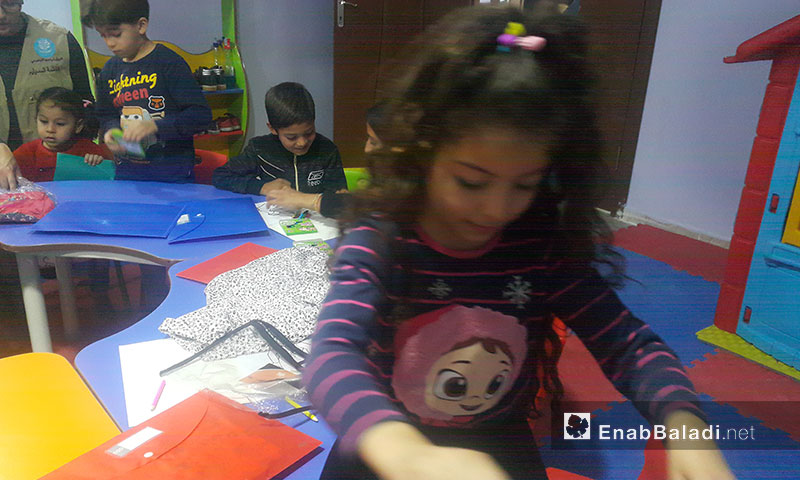Suaad Ali, a twenty-seven years old Syrian woman, joined the courses, which Tarahum 2 Community launched after its opening at the end of October in the Turkish city of Urfa. She wants to gain new skills and a profession to help her support her two children in exile.
The opening of the second center in the city was part of the activities supported by Ataa for Humanitarian Relief and the Kuwaiti volunteer team Tarahum in Ahmed Yasawi area in the presence of Syrian and Turkish personalities and diplomats from the Kuwaiti Embassy in Turkey.
After the death of her husband, Suaad started to have a difficulty in making a living for herself and her family. She told Enab Baladi that “It will be a harsh winter and we need clothes and heating while I do not have enough [money] in my pocket.”
The center, she said, provides people with coal, clothes and some of the school’s stationery. However, these provisions are not enough and do not cover the needs of all the Syrian people.
A developmental Center Supports Syrian People
For three years, Ataa has been supervising the monthly financial guarantees offered to 540 orphans in the city of Urfa.
The center’s members work in a building of many stories seeking to provide support to the participating people.
To Enab Baladi, Sheikh Nasser al-Bassam, the Director of the Kuwaiti team under the International Islamic Committee, said that opening the center aims to sharpen Syrian people’s skills and to support them in life, work and education. “It will have a positive effect, especially that the people in the center already have the skills and expertise required by the labor market in Urfa.”
According to al-Bassam, the center includes the following departments: Social and educational support, halls for seminars and lectures, a children’s playground and an orphanage with 20 children, who have been chosen to live there based on age, educational and financial level.
Ahmed al-Mawas, the Director of Usama ibn Zayd Center, which Ataa organization runs in the city of Urfa, said that Tarahum 2 used to offer developmental courses even before the center was officially opened. The most prominent of these courses are teaching Turkish and Arabic languages, computer skills, hairdressing, sewing, Quran memorization, fiqh and hadith.
According to al-Mawas, the center combines relief and development. “[The organization] is trying its best to make Syrian people active in their new environment.”
The center’s director assessed the needs of the Syrian people in the city of Urfa describing them as huge, stressing that the support which the center provides “does not cover everyone, and we need to combine all efforts and work with international organizations and the Turkish government to help the Syrians.”
“Syrian people can work and produce in the Turkish society by relying on themselves,” Sumaya al-Hint, who teaches sewing at the center, told Enab Baladi.
“It is necessary to enhance Syrian women in things relating to professions and handicrafts, such as sewing and hairdressing, as well as all that might help them settle down,” she said.
Tarahum 2 concentrates on women and young people both; it includes more than 40 women beneficiaries of sewing courses alone, according to Sumaya.
Al-Hint hoped that the trainees will be able to achieve self-sufficiency and become activate members in the society to change their position from relief consumers to producers in Turkey.
The majority of Syrian families live in the extreme parts and the neighborhoods that are far from the center of Urfa city. The latest statistics show that more than 700,000 Syrians in the whole of the state constitute 21 percent of its total population.

